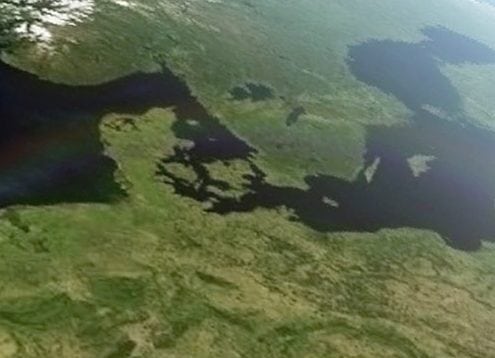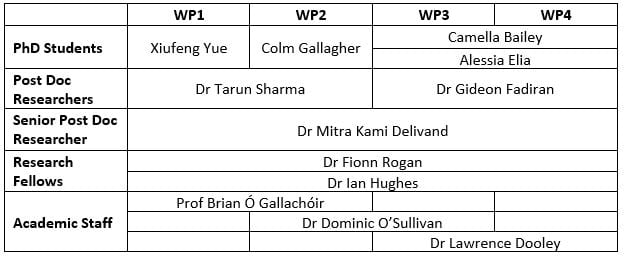
Opportunities for Ireland in a Low Carbon Economy – Our 2050

- Title
-
Opportunities for Ireland in a Low Carbon Economy – Our 2050
- Start Year
-
2015
- End Year
-
2018
- Funding Body
-
NTR Foundation & SFI
- Coordinator
-
UCC
- Research Area
- Key Contact
Summary
Researchers in UCC have established unique energy modelling capabilities over the past fifteen years in Ireland. This has been used to strengthen (i) the knowledge base underpinning Ireland’s energy and climate policy and (ii) Ireland’s negotiating position within the European Union on energy policy and climate mitigation targets. This project – Our 2050 – Opportunities for Ireland In A Low Carbon Economy – adds significant value to this capacity by building an ambitious new strand of research expertise in Ireland on the economic opportunities arising from the transition to a low carbon economy. The project research team is a multi-disciplinary collaboration between researchers in the Energy Policy and Modelling Group, the Intelligent Efficiency Research Group, and the Department of Management and Marketing. The project is providing a bridge between information generation and entrepreneurial business activity.
The research is:
- Exploring low carbon energy futures for Ireland with an emphasis on resilience in a large number of scenarios of varying ambition, risk, and cost
- Identifying technology opportunities for entrepreneurs in Ireland over the next 35 years arising from a low carbon energy future
- Assessing in detail the value chain for these opportunities in order to determine genuine win-wins for Ireland
- Developing an innovation system to enable the delivery of these opportunities.
-
Work Packages
The research content of the project consists of four work packages as shown below.
The research output of each WP will inform, and be informed by, the other WPs. For example, outputs from the WP1 on particular technology scenarios are being used in WP2 for a more detailed engineering analysis; outputs on particular technologies from WP1 and WP2 are being used in WP3 for a more detailed economic analysis of the value chain of the particular technology, and outputs from WP1-WP3 are being used for the innovation system policy analysis in WP4. There will be extensive feedback across all the WPs, with preliminary results from WP3 & WP4 being used to refine analysis in WP1 & WP2.
Energy System Analysis – WP1 Description
WP1 is using a suite of energy systems modelling tools to examine the trajectory, developments and changes within Ireland’s energy system (electricity, heat and transport) for the period out to 2050. Multiple scenarios are being developed to examine different configurations of the Irish energy system under various constraints of cost, security, risk and environmental impact. The suite of energy system modelling tools will be able to examine the overall performance of the energy system (in terms of system cost) for differing levels of GHG mitigation ambition (e.g. 60% reduction, 80% reduction, etc.); the tools will also be able to answer detailed questions of reliability and affordability for various parts of the energy system such as energy supply, energy carriers and energy demand-side.
By examining how key technologies perform in multiple scenarios, the WP will help to understand to what extent is there a trade-off between various constraints (e.g. security vs. cost) and what technologies are most robust under a wide range of input assumptions. For example, what is the role of bioenergy in various scenarios and what would be the implications of constrained biofuel imports? What would be the impact of varying timing and trajectory of wind energy deployment and how does wind interact with other technologies within the energy system, e.g. wind vs. gas. The suite of energy systems modelling tools will be able to look outside the electricity sector (which currently accounts for approximately 20% of our energy needs) to examine questions such as what technologies will fuel our future transport needs? What will heat our homes and other buildings? What will be the extent of energy efficiency in buildings and how will it be achieved?
Technology Opportunity Analysis – WP2 Description
The results of the scenario analysis from WP1 are being used to conduct an in-depth exploration of the low carbon energy technology opportunities arising within the full pipeline of the energy supply side, energy carriers, energy end-use and demand side. This WP is examining technology opportunities in all energy-using sectors of the economy: industry, services, residential, transport and electricity generation. This WP is using a multi-criteria assessment to examine technologies according to criteria such as feasibility, co-benefits, sustainability, security, etc. This WP will include extensive engagement with researchers dedicated to particular technologies (e.g. wave energy, Power to Gas, Big Data) in order to understand the full role these technologies could have in Ireland’s energy future.
Value Chain Analysis – WP3 Description
To fully understand and appreciate the economic implications and opportunities of a transition to a low-carbon energy system, the low carbon technologies examined in WP2 and WP3, are being subject to a value-chain analysis whereby each component part of the technology is analysed for its economic contribution and value. Taking wind energy (a relatively mature technology) as an example, there are opportunities arising within the materials & components value chain and the installation and consultancy value chain areas. For marine renewable energy, a value chain analysis might suggest more benefits from the R&D value chain, such as patents and intellectual property. This analysis is examining the full spectrum of opportunities arising from technologies being developed in Ireland and that the modelling analysis shows can have a role in a low carbon energy system.
Innovation System Analysis – WP4 Description
This WP is going beyond merely identifying opportunities, but is contributing to helping to deliver on these opportunities, through the development of an innovation system, which incorporates both technical engineering and business innovation insights. Building on on-going work characterising Ireland’s current low carbon innovation system, this work is using the innovation system framework to analyse the optimal technology-push conditions and market-pull dynamics that help maximise low carbon technology development, roll-out, take-up and diffusion. The research will show how the innovation system can identify and overcome barriers, e.g. through appropriate policy supports and market structures. The innovation system model will help explore the full implications that low carbon technology opportunities have on the wider economy such as the impact of R&D, improved energy security, development of indigenous resources, improved environmental performance, etc. The Cleantech Innovation Index 2012 stated that Ireland “is not bringing many technologies all the way from R&D to the market”
People
Identifying and enabling the opportunities in the transition to a low carbon energy future requires a critical mass of trained researchers, a big picture perspective and micro-level detail, appropriately developed tools, and a combination of ambitious research and engagement with industry, finance, and business. The project will be undertaken by a multi-disciplinary team of researchers and academic staff with a diverse range of skill-sets, academic training, and affiliations. The full team is shown below.

Publications / Presentations
Publications
- Gallagher C.V., Leahy K., O’Donovan P., Bruton K., O’Sullivan D.T.J. (2018) Development and application of a machine learning supported methodology for measurement and verification (M&V) 2.0 Energy In Buildings 167, 8-22
- Gallagher C.V., Bruton K., Leahy K., O’Sullivan D.T.J. (2018) The suitability of machine learning to minimise uncertainty in the measurement and verification of energy savings Energy In Buildings 158, 647-655
- Yue X., Pye., De Carolis J. Li F G.N., Rogan F., Ó Gallachóir B. A Review of Approaches to Uncertainty Assessment in Energy System Optimization Models Energy Strategy Reviews 21, 204-217
- Kamidelivand M., Cahill C., Llop M., Rogan F., Ó Gallachóir B. A comparative analysis of substituting imported gas and coal for electricity with renewables – an input-output simulation Sustainable Energy Technologies and Assessments 30, 1-10
- Yue X., Rogan F., Glynn J., & Ó Gallachoir B. From 2 °C to 1.5 °C: How Ambitious Can Ireland Be? in Limiting Global Warming to Well Below 2 °C: Energy System Modelling and Policy Development, Springer
Policy Briefs
- Hughes I., Rogan F., Ó Gallachoir B. Innovation for System Transition
- Hughes I., Rogan F., Ó Gallachoir B. Visioning and Evaluating Long Term Transition
- Elia A., Rogan F., Ó Gallachoir B. Wave Energy Innovation Needs
- Fadiran G., Rogan F., Ó Gallachoir B. Opportunities for Natural Gas & Biogas Vehicles in Freight
- Yue Y., Rogan F., Ó Gallachoir B. Identifying Technology Opportunities In The Low Carbon Energy Transition
- Sharma T., Rogan F., Ó Gallachoir B. Risks and Returns of Technology Opportunities in The Energy Transition
- Kami Delivand, M., Rogan F., Ó Gallachoir B. Job Opportunities From Ireland’s Electricity Interconnectors
- Gallagher C., Rogan F., O’Sullivan D. Capturing the Energy Efficiency Opportunity
Conference Presentations
- Elia A., Chiodi A., Rogan F., Ó Gallachóir B.P. 2018 Wave energy in Ireland – innovation needs for deployment by 2050 37th International Energy Workshop, June 19-21st 2018 Chalmers University of Technology, Gothenburg, Sweden.
- Delivand M.K, de-la-Rua C., Lechon P.Y., Rogan F., Ó Gallachóir B. 2018 Socioeconomic spillovers of the European electricity network development plan Proc. 16th International Conference on Clean Energy, May 9-11th 2018, Famagusta, Cyprus
- Fadiran G., Sharma T., Rogan F., Ó Gallachoir, B. P., 2018 ‘’On the path to a low carbon economy: Modelling transition to natural gas vehicle in road freight”, 37th International Energy Workshop, 2018, Chalmers University of Technology, Sweden
- Yue, X., Rogan, F., Glynn, J., Ó Gallachóir, B.P. 2017. Assessing mitigation feasibility and options for Ireland in 2050 with ESOM based MACCS. Proc 10th Annual Meeting of the Integrated Assessment Modelling Consortium 5-7th December 2017 Recife, Brazil
- Hughes I., Rogan F. Psychology as an Indispensable Factor in Visioning and Creating the Future (in review) Anthropological Association of Ireland Annual Conference 21-23rd September 2017, Queen’s University Belfast
- Elia A., Chiodi A., Rogan F., Collins S. Ó Gallachóir B.P. 2017 Ocean energy in Ireland: modelling and innovation needs analysis for deployment by 2050 12th European Wave and Tidal Energy Conference (EWTEC) 2017 Conference Cork| August 27th -31st 2017
- Fadiran G., Rogan F. and Ó Gallachóir, B.P., 2017 Modelling sustainability transition and incentive policy views with agent based model 36th International Energy Workshop 2017, July 12-14, University of Maryland, College Park, Maryland, USA
- Sharma, T., Rogan, F., Ó Gallachóir, B.P. 2017. Characterize technology resilience and technology opportunities in transitioning energy systems: A new rank trajectory methodology. International Energy Agency –ETSAP Workshop, University of Maryland, 10-11 Jul, USA.
- Delivand M.K, Cahill C., Llop M., Rogan, O’Gallachoir B. 2017. An input-output model for Irish economy- a preliminary study of stepwise substituting imported fossil-fuel electricity with renewable electricity. Workshop on Sustainability Performance of the Energy Systems 29-30 May, Madrid, Spain
- Gallagher C., Bruton K., O’Sullivan D.T.J., Utilising the cross industry standard process for data mining to reduce uncertainty in the measurement and verification of energy savings, in: Lecture Notes in Computer Science Vol 9714, Springer International Publishing, 2016: pp. 48–58. doi: 10.1007/978-3-319-40973-3_5
- Rogan F., Bolger P., Ó Gallachóir B. 2016 Meta-analysis Of Energy Innovation System of 39 Countries Proc. British Institute of Energy Economics 11th Annual Conference 2016, September 22-23, 2016, Oxford, UK
Invited Presentations
- Rogan F. 2018 Delivering on the energy efficiency opportunity for Ireland – 7th Annual IERC Conference ‘Energy Resilience in a Low Carbon Economy’ 14th March 2018, Fota Island, Cork
- Ó Gallachóir B. and Hughes I. 2017 Being Innovative About Evaluating Innovation. Department of Foreign Affairs, Evaluation and Audit Unit Seminar Series, Iveagh House, Dublin, 2nd November 2017
- Elia A. Modelling innovation in the energy system Thesis in 3 Competition, Dublin Airport, September 2017
- Sharma T. Ranking technology opportunities 2017 Our 2050 – Mid-Project Event, June 19th 2017, Wilton House, Dublin
- Yue X. Identifying technology opportunities 2017 Our 2050 – Mid-Project Event, June 19th 2017, Wilton House, Dublin
- Gallagher C. Verifying implemented opportunities in industry 2017 Our 2050 – Mid-Project Event, June 19th 2017, Wilton House, Dublin
- Fadiran G. Exploring opportunities for biogas and freight 2017 Our 2050 – Mid-Project Event, June 19th 2017, Wilton House, Dublin
- Bailey C. Lessons from harnessing wind energy opportunities 2017 Our 2050 – Mid-Project Event, June 19th 2017, Wilton House, Dublin
- Elia A. Delivering Ocean Energy Opportunities 2017 Our 2050 – Mid-Project Event, June 19th 2017, Wilton House, Dublin
- Delivand M.K. Opportunities from decarbonizing the economy 2017 Our 2050 – Mid-Project Event, June 19th 2017, Wilton House, Dublin
- Bailey C., Rogan F., Ó Gallachóir B.P. 2017 The Push and Pull Factors of Ireland’s Wind Energy Industry IWEA Annual Conference 2017 March 28-29th 2017, Clayton Hotel, Dublin
- Rogan F. 2016 Our 2050 – Opportunities for Ireland in a Low Carbon Economy Energy Cork – Innovation in the Energy Sector conference November 25th 2016, IERC, Cork
- Rogan F. and Ó Gallachóir B.P. 2017 Future of Ireland’s Energy Policy and Challenges of Decarbonisation. Proc EirGrid Annual Conference, Dublin Castle 26th January 2017
- Rogan F. Modelling investment in RD&D – Will Mission Innovation make a difference? 2016 Proc. IEA ETSAP Workshop on Energy Models & Applications Todai, Tokyo, Dec 14th 2016
- Kami Delivand M. What can we get from the input-output analysis when evaluating a low carbon society? Take 15 ERI Lunchtime Seminar ERI, UCC, June 13th 2017
- Rogan F. Economic opportunities for Ireland from the Low Carbon Energy Transition 6th Annual ESRI-MaREI-UCC Seminar on Energy Policy Research May 23rd 2017, ESRI, Sir John Rogerson Quay, Dublin
- Rogan F., Ó Gallachóir B.P., Watson C. Energy Policy and Modelling Research: Overview and Reflections on Policy-Making Process PSAI Specialist Group on Environmental Politics Workshop 23rd June 2017 Queen’s University Belfast
- Yue X., 2016 Techniques for running large number of scenarios in TIMES. Proc. 69th Semi-annual IEA ETSAP Workshop, May 30 – 31 2016, Cork, Ireland.
- Bailey C. Innovation – lessons learned from wind energy deployment MaREI Symposium Research, Development and Innovation in Marine and Renewable Energy in Ireland NUIG 5-6th May 2016
- Yue X. Sensitivity Analysis of Irish TIMES scenarios using Monte Carlo simulations MaREI Symposium Research, Development and Innovation in Marine and Renewable Energy in Ireland NUIG 5-6th May 2016
- Elia A. Developing an innovation ecosystem for the low carbon economy transition MaREI Symposium Research, Development and Innovation in Marine and Renewable Energy in Ireland NUIG 5-6th May 2016
- Gallagher C. Economic Opportunities for Energy Efficiency MaREI Symposium Research, Development and Innovation in Marine and Renewable Energy in Ireland NUIG 5-6th May 2016
- Gallagher, C.V., Bruton, K., O’Sullivan, D.T.J., (2016) Utilising the cross industry standard process for data mining to reduce uncertainty in the measurement and verification of energy savings, In First International Conference on Data Mining and Big Data, Bali, Indonesia. DOI: https://doi.org/10.1007/978-3-319-40973-3_5
Visualization Platform
Final Project Event
We hosted a final project event in Dublin on December 10th 2018.
The final agenda for the Final Project Event is online (here) and an abridged version with links to the presentations and visualisation platform is below:
- Project Overview (Brian Ó Gallachóir)
- Visualisation Platform Demonstration (Fionn Rogan)
- Identifying technology opportunities (Xiufeng Yue)
- Risk & returns of technology opportunities (Tarun Sharma)
- Wave energy innovation needs (Alessia Elia)
- Job opportunities from interconnection (Mitra Kamidelivand)
- Exploring opportunities for gas & freight (Gideon Fadiran)
- Capturing the energy efficiency opportunity (Colm Gallagher)
- Evolving energy and innovation policy (Ian Hughes)
Projects Impacts
An impact statement of the project is available below.
| Our 2050 Project Impacts | Download |
Two videos describing the impact of the project can be viewed below.



